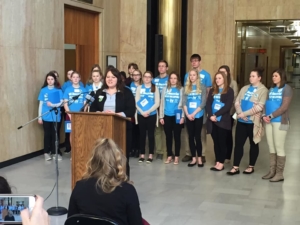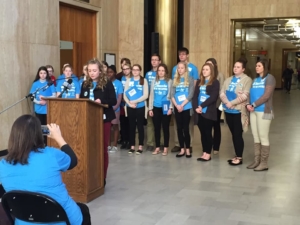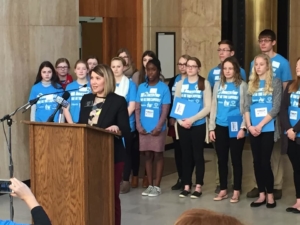*April 6 Update* The Federal Trade Commission posted the complaint on their website. You can read the complaint by clicking here.
This article appeared on Bloomberg’s Business News webpage on April 2. The original link to the story can be found here
FTC Sues to Unwind Altria’s $12.8 Billion Juul Investment
By: Angelica LaVito and David McLaughlin
U.S. antitrust officials sued to reverse Altria Group Inc.’s troubled $12.8 billion deal to take a stake in vaping company Juul Labs Inc., saying the companies are competitors who shouldn’t be in business together.
The move further chips away at a much-heralded late 2018 deal that was supposed to combine the marketing might of Marlboro maker Altria with the savvy cool of Silicon Valley startup Juul. Instead, Altria has written down the investment twice, slashing the 35% stake’s value to $4.2 billion in January as health concerns about e-cigarettes led to a regulatory crackdown. Nonetheless, Altria vowed Wednesday to defend the deal.
The Federal Trade Commission’s complaint argues that Altria and Juul were aggressive rivals until Altria decided to end the competition by shutting down its own e-cigarette brands, MarkTen and Green Smoke, before acquiring its stake in Juul.
“Altria and Juul turned from competitors to collaborators by eliminating competition and sharing in Juul’s profits,” Ian Conner, director of the FTC’s Bureau of Competition, said in a statement
The complaint is the latest hurdle for the deal, which gave the largest U.S. cigarette maker a piece of the nation’s largest e-cigarette maker and was criticized from the start. Altria investors bemoaned the price tag and longtime Juul employees said the transaction flew in the face of Juul’s stated mission to rid the world of cigarettes.
The FTC’s challenge could cost Altria its piece of the e-cigarette market, which had appeared to be an avenue for growth as smoking rates decline and the market for tobacco shrinks. At the same time, it could release the company from the troubled investment. Complicating the process for Altria is the fact that Chief Executive Officer Howard Willard has contracted Covid-19 and has taken a medical leave of absence.
Altria shares gained 0.9% to $37.95 in premarket trading Thursday. Through the close of trading Wednesday, the stock had fallen 25% this year, roughly in line with the drop in the broader market caused by the coronavirus crisis.
“We believe that our investment in Juul does not harm competition and that the FTC misunderstood the facts,” Altria General Counsel Murray Garnick said in a statement. Juul declined to comment.
For Juul, it poses yet another hurdle for the embattled company to overcome as it grapples with investigations of its business practices that allegedly helped spark a surge of underage vaping. The company is now a target of federal investigations and lawsuits from parents and school districts. The FTC also has a separate probe into the company’s marketing.
Juul and other e-cigarette makers must soon submit applications to the Food and Drug Administration to continue selling their products in the U.S.
It’s unclear how the investment could be unwound. Juul has spent the bulk of the $12.8 billion to pay out investors and award bonuses to its employees. Other Juul investors include Fidelity Investments and Tiger Global Management. Altria was supposed to gain voting rights and board seats at Juul with antitrust clearance.
Unanimous Vote
The FTC’s five commissioners voted unanimously to file a complaint in its administrative court and a trial has been scheduled to begin on Jan. 5, 2021. The complaint threatens to tie up Altria in litigation for months. The cases are heard by an administrative law judge and then by the full five-member commission. Decisions can be appealed to federal court.
The complaint, which hasn’t been made public, follows a year-long investigation by the FTC into whether Altria’s investment violated antitrust laws.
In October 2018, Altria pulled its pod-based e-cigarette products from the market and sent a letter to Scott Gottlieb, then the commissioner of the Food and Drug Administration, blaming products like Juul’s for fueling a teen vaping epidemic. Two months later, Altria closed its e-cigarette business entirely and then announced its Juul investment.
As part of the deal, Altria gave Juul some of its shelf space and promised its help with an upcoming regulatory application that will determine whether Juul can continue to sell its e-cigarettes in the U.S. In the fall of 2019, a longtime Altria executive who pursued the investment, K.C. Crosthwaite, took over as Juul’s CEO and hired Altria colleague Joe Murillo as Juul’s chief regulatory officer.
Health Scare
Juul, once among the most valuable start-ups in the U.S., saw its fortunes quickly diminish last year. A health scare that was later tied to faulty cannabis vaping products spooked consumers and prompted governors and state regulators to crack down.
The company laid off about 650 people last fall and implemented a $1 billion restructuring plan. A number of executives have left amid the shake up. Co-founder James Monsees and Chief Transformation Officer Guy Cartwright both left within the past month.
Altria has been “highly disappointed” in the investment, CEO Willard said in January. Lawsuits accusing Juul of hooking minors to nicotine have ballooned, including many that name Altria as a co-defendant. The company has since narrowed the terms of its cooperation with Juul away from marketing and solely to gaining regulatory approval.
FTC Scrutiny
The FTC is increasingly questioning deals where upstart competitors are swallowed up by established players. In February, the agency demanded new information about startup acquisitions by Alphabet Inc., Apple Inc., Amazon.com Inc., Facebook Inc. and Microsoft Corp. that had previously flown under its radar to determine whether they should have been blocked. The same month, the FTC sued to block the merger of Edgewell Personal Care Co., the maker of Schick razors, with Harry’s, the shaving-supply company.
The U.S. Securities and Exchange Commission is investigating the Altria-Juul deal, according to a report last month from the Wall Street Journal.
(Updates stock-price information in seventh paragraph. A previous version of this article corrected the date that Altria closed down its e-cigarette business in 14th paragraph.)














